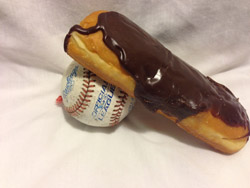1. It is much easier for a newborn to latch onto a rubber bottle nipple than a breast.
The hardest time to breastfeed is the first few days after your baby is born. You are exhausted and sleep-deprived from labor and delivery. You finally fall asleep and, three hours later, someone wakes you up to spend ~30 minutes attempting to get a crying infant onto the breast. Exhausted and frustrated, many women choose to give their baby a bottle of formula. The baby sucks down the whole thing rapidly, incorrectly convincing parents that he or she is hungry and not able to be satisfied by the breast.
Newborns suck on a bottle because it is a reflex, not simply because they are hungry. And newborns will drink larger quantities out of a bottle than the breast simply because they keep sucking by reflex. Newborns are very well hydrated at birth and have a stomach full of calorie-rich amniotic fluid. They don’t really depend on breast milk for nutrition or hydration during the first 24-48 hours. This time is really for mother and baby to learn how to breastfeed, a difficult task for both!
2. Parents worry that they are not feeding their baby enough and/or mom’s milk supply is too low.
For better or worse, mothers don’t know the quantity of milk fed to an infant when he or she is at the breast. Nervous parents always worry that the baby is not drinking enough. The best way to judge if an infant is getting enough is by how frequently they urinate. This is complicated by the very absorbent disposable diapers that are now available and the appropriately small quantities of urine that newborns make. It can be almost impossible to tell if a newborn has urinated! Frequently, new mothers are encouraged to use a breast pump to express milk due to some difficulty with the initiation of breastfeeding.
Although breast pumping can, at times, be a useful intervention, mothers notice that they are making one to four ounces of milk every 3-4 hours. Although this is normal, many women think this does not seem like enough because formula comes prepackaged in 3-4 ounce bottles. Many women only pump after breastfeeding, further decreasing the quantity of milk pumped. This is when parents often start “supplementing,” giving the infant formula after he or she breastfeeds. The infant, by reflex, will suck on the rubble bottle nipple and drink some of the formula, incorrectly leading parents to believe that their infant is not getting enough milk from the breast.
3. Mothers are afraid or uncomfortable breastfeeding in public.
A St. Louis county shopping mall and a Missouri amusement park recently built private breastfeeding stalls—little spaces with a chair and a curtain that can close in front. It is great that these institutions are trying to promote breastfeeding, but why should women be expected to stop what they are doing and breastfeed in a little hidden space? This might be a useful amenity for infants that do require quiet space to nurse well or women who choose to be very private about nursing. However, it seems to imply a larger social message that nursing is still not considered acceptable in public. Busy women need to be able to breastfeed in the check-out line at the grocery store, in church or at a business meeting, or while attending another child’s sporting event. If women always need to run off to some secluded space to breastfeed, it just becomes too difficult.
4. Infant jaundice causes many healthcare professionals to suggest formula supplementation in the first week of life.
It is true that breastfed infants are more likely to develop jaundice than formula-fed infants. Jaundice is a yellow coloring to the skin and the whites of the eyes and develops due to immaturity of the newborn liver. There are many theories that jaundice may actually be beneficial to infants. But it is also true that severe jaundice is a serious medical condition. One method of treating jaundice is to switch a baby to formula from breast milk for a few days. This method of treatment is easier than other forms of therapy such as home phototherapy. As a pediatrician, I feel formula feeding is usually not the best first-line treatment. Unfortunately, many women just stop breastfeeding all-together after they are advised by a health care professional that formula is best for their infant due to jaundice.
5. Hormonal birth control can reduce breast milk production.
Breastfeeding is a minimally effective form of birth control, and should not be used as an exclusive form of birth control. Most oral contraceptives (“the pill”) do cause a decrease in breast milk production. That said, most women are still able to produce enough milk to exclusively breastfeed, especially if oral contraceptives are not started until six weeks post-partum. Some women, however, do not make enough milk to exclusively breastfeed while taking oral contraceptives and must supplement their infants with formula. I find that most OB-GYNs do not discuss this risk with breastfeeding women prior to prescribing birth control. Infants that are supplemented with formula, even one bottle a day, wean from the breast earlier than exclusively breastfed infants. There are some forms of oral contraceptives, such as “the mini-pill”, that do not decrease breast milk production.
6. Antidepressants and other prescription drugs lead many women to avoid breastfeeding.
Most prescription drugs are safe during breastfeeding. But health care professionals often don’t know how to find appropriate data to support continued breastfeeding while on prescription drugs. Sadly, many physicians just tell women to “pump-and-dump” for prolonged periods of time just because they don’t know or are unable to look up information on prescription drug compatibility with breastfeeding. Sadly, I have seen many women stop breastfeeding after anesthesia for surgery or because they had to take an antibiotic. Breastfeeding while on antidepressant drugs known as SSRIs is especially controversial right now. There is no true medical consensus regarding the safety of SSRIs in breastfeeding.
7. Breastfeeding affects female sexual function.
No one seems to talk about this, but it’s true. Most breastfeeding women experience vaginal dryness. Some women experience a decrease in libido. Although others report an increase.
8. Breast pumping at work is hard.
Going back to work is a very common reason why committed breastfeeding mothers have to stop. Breast pumping at work is time-intensive and very boring. Generally, women end up locking themselves in a closet somewhere during their lunch hour. Then they have to find an appropriate way to refrigerate their expressed breast milk. Breast pumping at work is awkward, antisocial, and boring. Be sure to get an efficient electric pump. Try to do something enjoyable while pumping, such as reading or watching TV. Especially skilled pumpers can even use hands-free pumping bras or single-handed double pumping techniques to work on a computer while pumping. Consider making business phone calls while pumping.
9. Moms really don’t want to give up their coffee and alcohol.
And, you don’t have to. It is generally safe to pump or breastfeed just before drinking alcohol or caffeine, and then breastfeed again 3-4 hours later. Moderate quantities of alcohol or caffeine are usually out of your system and your breast milk in 3-4 hours. Breastfeeding mothers can very safely enjoy one alcoholic or caffeinated beverage each day, even without giving much thought to the timing between consumption and breastfeeding. For especially concerned mothers, commercially available breast-milk testing strips are now available to determine if there is alcohol in your breast milk. These can be purchased online and are also available at certain chain pharmacies.
10. Breastfeeding is time-consuming, especially for women who are watching other children.
The good news is that women have been breastfeeding while watching toddlers since antiquity. Creative women amaze me in the ways they manage to nurse while doing everything else life requires! Social acceptance of public breastfeeding is key. Women cannot breastfeed and meet their other commitments unless they nurse in public. What have you done while breastfeeding?
11. Most babies don’t like infant vitamins.
Exclusively breastfed infants should be supplemented with vitamin D. Most commonly available forms of infant vitamins such as Poly-vi-sol and Tri-vi-sol are not pleasant to give to babies. Most babies seem to make funny faces when given these vitamins. And the vitamins can stain clothing and carpets badly. I have heard of women who stopped breastfeeding because they did not like giving the vitamins. Try putting the vitamins in the refrigerator to improve taste. Sunshine vitamins is making a sweetener-free infant vitamin D supplement that is supposed to be more palatable because it only contains vitamin D, which is all healthy newborns need anyway.





My 29-year-old son was premature, and I tried pumping for weeks. I spent so much time in the NICU mother’s room, pumping for hours, and would only get a small amount of breastmilk. Other moms were filling their bottles, so I thought something was wrong and I gave up. How I wish this encouraging information had been available to be back then. Now my daughter, a mom of 4, has breastfed all of her children for over a year each. So glad information is becoming more available.
I found that my milk supply was sensitive even with the mini-pill. Unfortunately, I didn’t make the connection with baby #1 and I had to supplement early on. My experience with her was marked by a poor latch early on as well, and she never quite got it. We did the finger feeding, nipple shields, and several visits to a LC to no avail. After a few weeks, I started exclusively pumping and still had to supplement 50/50. It was an exhausting first 5 months with her when I finally transitioned her to formula upon returning to work. I suspected it with baby #2 (BF for 7 months until returning to work), and made sure not to take it after #3 was born. If we have another, I will avoid it again. I found, too, that it was not a risk mentioned by my OB–it was only brought to light once I asked about it–and I had what I considered to be a WONDERFUL OB. It’s just one of those things that vary between individuals (I found I had a very sensitive milk supply) and took the experience of multiple children for me to recognize and address. Avoidance of hormonal contraception and on-demand feeding for the first 4-6 months resulted in my most positive nursing relationship with my 3rd child. Not returning to work within the first year was probably a large contributing factor as well. He happily weaned at 12 months.
This is a great article. I had lactation consultants to tell me breastfeeding wouldn’t hurt and it did. My little one had jaundice but thankfully her pediatrician said formula was the last resort and baby was able to get therapy. I wish this info was common and discussed often. Breastfeeding can be isolating if you let it.